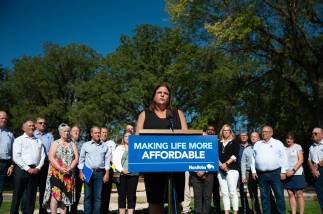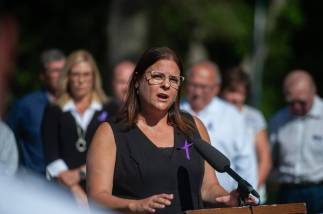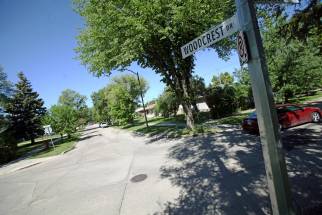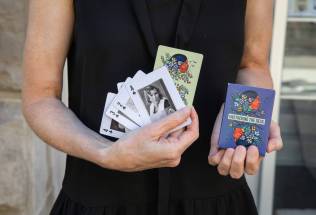Province announces ‘affordability’ funds
Read this article for free:
or
Already have an account? Log in here »
To continue reading, please subscribe:
Monthly Digital Subscription
$0 for the first 4 weeks*
- Enjoy unlimited reading on winnipegfreepress.com
- Read the E-Edition, our digital replica newspaper
- Access News Break, our award-winning app
- Play interactive puzzles
*No charge for 4 weeks then price increases to the regular rate of $19.00 plus GST every four weeks. Offer available to new and qualified returning subscribers only. Cancel any time.
Monthly Digital Subscription
$4.75/week*
- Enjoy unlimited reading on winnipegfreepress.com
- Read the E-Edition, our digital replica newspaper
- Access News Break, our award-winning app
- Play interactive puzzles
*Billed as $19 plus GST every four weeks. Cancel any time.
To continue reading, please subscribe:
Add Free Press access to your Brandon Sun subscription for only an additional
$1 for the first 4 weeks*
*Your next subscription payment will increase by $1.00 and you will be charged $16.99 plus GST for four weeks. After four weeks, your payment will increase to $23.99 plus GST every four weeks.
Read unlimited articles for free today:
or
Already have an account? Log in here »
Hey there, time traveller!
This article was published 31/08/2022 (1193 days ago), so information in it may no longer be current.
The Progressive Conservative government is cutting cheques for families and low-income seniors struggling beneath the mounting cost of living, but stopped short of ponying up cash to help all Manitobans feeling the sting of high inflation.
“Everyone is feeling the pinch right now,” Premier Heather Stefanson said during a Wednesday morning announcement at a St. Vital playground, flanked by more than a dozen of her PC colleagues.
“It’s hard enough for many, many families, as well, to make ends meet — and we want to ensure that we’re helping them.”
Weeks after promising relief from 40-year-high inflation was on the way, Stefanson said the province will spend $87 million to mail cheques to families with a net household income less than $175,000 and to seniors with a household income less than $40,000.
Eligible families will receive a $250 benefit cheque for the first child and $200 for each additional child. An estimated 145,000 households are expected to benefit, according to the province.
Eligible seniors, meanwhile, will receive $300, if they claimed the Education Property Tax Credit in 2021. An estimated 52,000 households are expected to receive such a cheque.
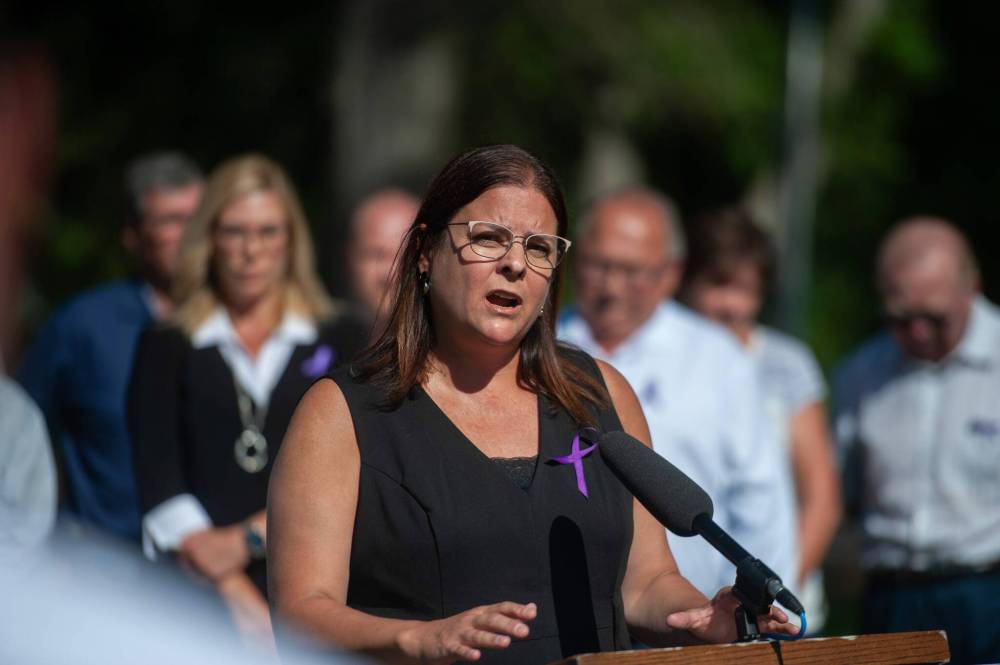
Employment and income assistance rates will also increase permanently in November, the premier said. That means an extra $50 for adults without dependent children and an extra $25 for disability claimants per month.
“We think that this is the responsible and practical approach to help those that are most in need right now,” Stefanson said when pressed on why her government has excluded from the program working adults who do not have children.
Provinces including Saskatchewan and Quebec have issued inflation relief payments of $500 for all adults, with the latter limiting the benefit to people with a net income of $100,000 or less. Stefanson said the Manitoba government is focused on getting cheques out in the broadest and most expeditious way.
“We’ve already taken a number of measures,” Stefanson added. “This is one more step in that direction — and we’ll continue to move in that direction to ensure that the most vulnerable Manitobans get what they need in these very difficult times.”
“This is one more step in that direction– and we’ll continue to move in that direction to ensure that the most vulnerable Manitobans get what they need in these very difficult times.” – Premier Heather Stefanson
Canadian Association of Retired Persons Winnipeg chapter vice-president Carmen Nedohin said the $300 cheque will make a difference to some seniors. However, it will not be enough to cover cuts to the education property tax rebate for renters and the seniors school tax rebate.
Many will roll their eyes at the payment, she said.
“You’ve taken away from Peter to pay Peter in this case,” Nedohin said. “And now they’re saying to Peter, ‘OK, here’s some of your money back. Look at what we’re doing, isn’t this fantastic?’”
Canadian Centre for Policy Alternatives Manitoba office director Molly McCracken was also critical of the program, saying the cheques do not go far enough, and the province’s program will not reach enough people, to make a meaningful impact.
Instead, it will put additional funds into the pockets of families with an above-average household income, rather than target those most in need, McCracken said.
According to Statistics Canada, the median income of a two-person household in Manitoba was $99,100 in 2020.
“It’s disappointing this is not more evidence-based. We do have a lot of data on who’s most impacted by the inflationary increases: those are low- and moderate-income households who spend more of the proportion of their money on the basic needs that are affected by inflation, of food, shelter, and fuel,” McCracken said.
The benefit cheque for families, meanwhile, is a drop in the bucket compared to the extreme inflationary pressure they are feeling, she said.
“Hopefully, (government is) listening and can do more, and more in a more comprehensive way, for those most in need. And soon, because people are really feeling the pinch.”
“Hopefully, (government is) listening and can do more, and more in a more comprehensive way, for those most in need. And soon, because people are really feeling the pinch.” – Molly McCracken
Finance Minister Cameron Friesen said the $175,000 threshold for benefit cheques was reached by multiplying the average industrial wage by 3 1/2 times.
Friesen argued households with a net income of $100,000 or more are also struggling with the cost of living. “Raising children is expensive,” he said.
Christopher Adams, an adjunct professor of political studies at the University of Manitoba, said the Tories are hoping to win favour with suburban Winnipeg voters and seniors heading into the general election next year.
Holding back cheques for other Manitobans is unlikely to hurt the party in the polls, Adams wagered.
“There will be some who, rightly or wrongly, will be concerned that they’re left out in the fact that they’re not running a household with children,” Adams said. “The suburban Winnipeg voters are, by and large, families and those are the ones who are concerned about inflation.”
“The suburban Winnipeg voters are, by and large, families and those are the ones who are concerned about inflation.” – Christopher Adams
Adams said the boost to welfare rates could also signal increased attention by government to the needs of people on social assistance.
“Manitoba has a real poverty problem and it has a real poverty problem with children,” he said. “It reverberates into a lot of other things like education, health and welfare, and so we do need to see poverty reduced in this province.”
Harvest Manitoba chief executive officer Vince Barletta said his organization has long advocated for an increase to welfare rates, adding this is the first increase to general assistance in about two decades.
“When inflation’s high, it’s the people who have the least that hurt the most,” Barletta said. “And so any increase to EIA rates, the $50 we saw in the announcement today, is going to have a big impact.”
— with files from Malak Abas and Dylan Robertson
danielle.dasilva@freepress.mb.ca
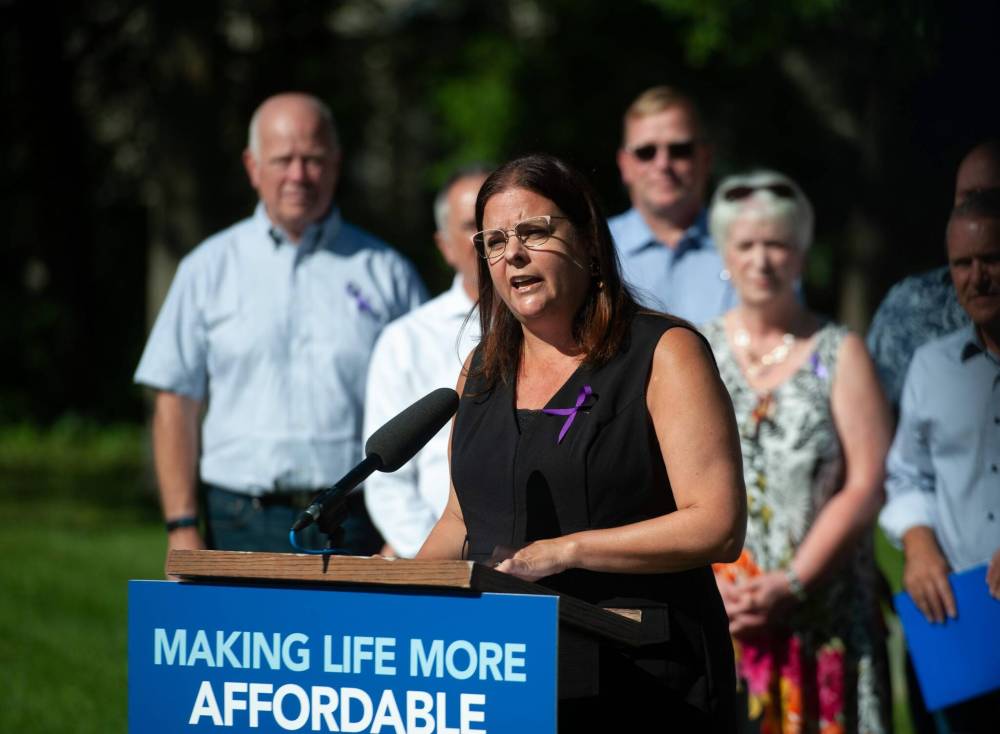
ETHAN CAIRNS / WINNIPEG FREE PRESS
Premier Heather Stefanson said the province will spend $87 million to mail cheques to families with a net household income less than $175,000 and to seniors with a household income less than $40,000.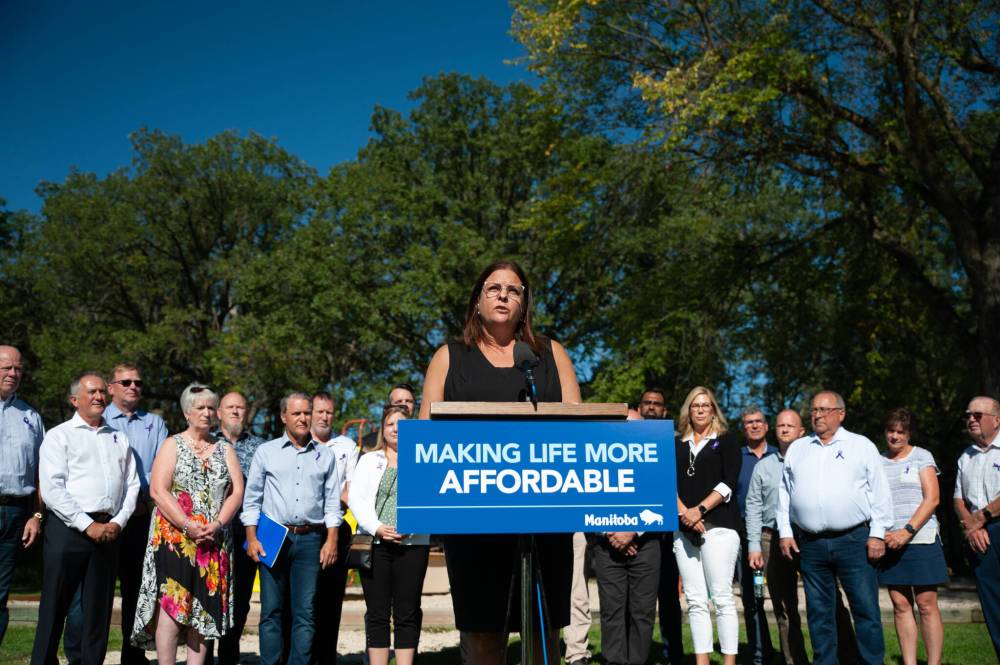
ETHAN CAIRNS / WINNIPEG FREE PRESS
Premier Heather Stefanson said the Manitoba government is focused on getting cheques out in the broadest and most expeditious way.NDP, Liberals blast Tories for cutting cheques
Reaction to the Progressive Conservative government’s affordability program from across the aisle was highly critical Wednesday.
Opposition Leader Wab Kinew accused the Tories of trying to buy Manitobans’ support with their own tax dollars.
“That’s after raising Hydro rates by hundreds of dollars. At the same time, families can’t get the surgeries they need and are waiting longer than ever at emergency rooms,” Kinew said in a statement. “Manitobans are looking for long-term help with the rising cost of living that will help them through the fall and winter.”
Liberal Leader Dougald Lamont said the government is out of touch with the desperation in many Manitoba households and with the causes of inflation.
“This is barely a Band-Aid,” the St. Boniface MLA said. “This will provide scant relief when seniors and families are at the breaking point because of pandemic debts and price gouging by oil companies and other corporations.”
Cheques issued under the family affordability program will be in the mail by late September, according to the province.
People who are eligible for the benefit will automatically be sent a cheque at the address on their 2021 tax return.
According to the province, it will launch a web portal to handle address changes for people who require.
The cheques will not impact a persons’ tax situation or benefits and are considered an “advance payment of a refundable tax credit.”
According to the province, seniors who could not claim the Education Property Tax Credit due to having received Employment and Income Assist or Rent Assistance will also receive a cheque.
The total cost of the affordability program is estimated to be $87 million.
Family households (estimated at 145,000) will receive a total of $63 million and senior households (estimated at 52,500) will receive about $16 million.
The cost to increase employment and income assistance rates is about $6.6 million. The change will come into effect in October, for the month of November.
The program also includes a one-time Food Security Fund worth $1.7 million.
The fund will provide temporary relief to organizations that provide food to Manitobans in need and are experiencing financial difficulty due to rising costs and inflation.

Our newsroom depends on a growing audience of readers to power our journalism. If you are not a paid reader, please consider becoming a subscriber.
Our newsroom depends on its audience of readers to power our journalism. Thank you for your support.
History
Updated on Wednesday, August 31, 2022 11:59 AM CDT: Corrects typo
Updated on Wednesday, August 31, 2022 3:48 PM CDT: updates photo
Updated on Wednesday, August 31, 2022 11:59 AM CDT: Corrects typo




